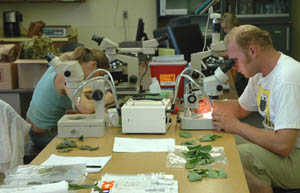Plant Clinic Closing Soon | |
|---|---|
| August 28, 2007 | |
|
You may have heard that the University of Illinois Plant Clinic will be closing in mid-September. That is true. The lab is seasonal, open from May 1 to mid-September every year. This has proven to be the time when most samples are sent. In addition, staffing is funded for only the growing season. This year, the Plant Clinic requests that all plant samples arrive by September 15th for full processing. Staff will remain until those samples have been completed. Samples arriving after September 15th will not be processed. If you would like more information about the Plant Clinic, visit the clinic Web site at http://plantclinic.cropsci.uiuc.edu/.  Where do you go for help when the Plant Clinic is closed? Start with your local UI Extension office. Follow this link to find the Extension office near you: http://web.extension.uiuc.edu/cie2/offices/findoffice.cfm. Even if the needed specialist is not on staff, every Illinois Extension office has digital cameras and equipment to send samples through the distance diagnostic network. You must still provide background information, but it will be sent online, along with images of your problem. Samples are sent to Extension specialists throughout Illinois for help. If you are a commercial grower and you have a good idea of the type of problem, you can call one of the campus specialists listed here. Do not send plant samples to these specialists. These phone numbers are provided as a starting point to finding someone who can help with your plant problems.
The Plant Clinic staff thanks those who have used our service in the past and welcomes those who may use it in the future. The quality of the samples and support information has improved over the years, allowing us to provide more accurate diagnosis. �� | |
| Author: | Nancy Pataky |
